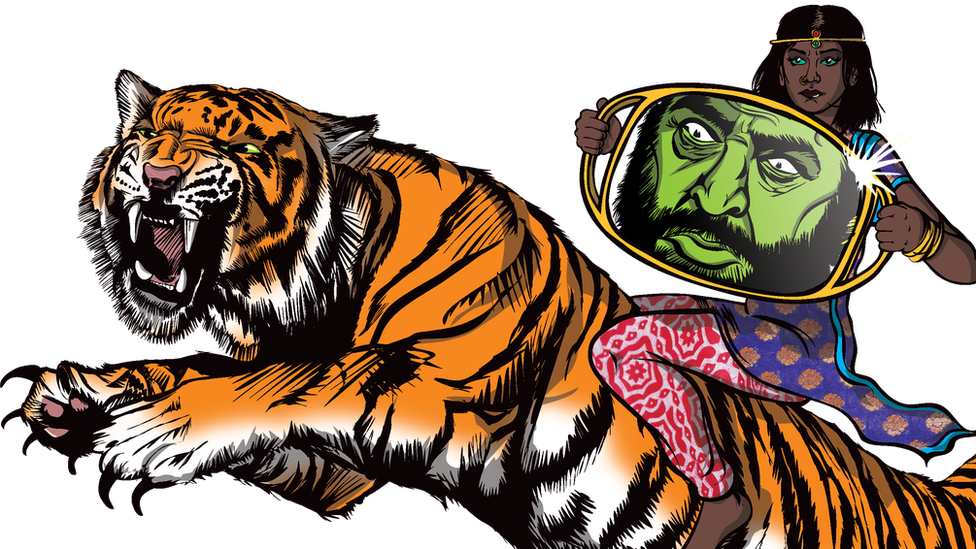Priya: India's female comic superhero returns to rescue 'stolen girls'
- Published
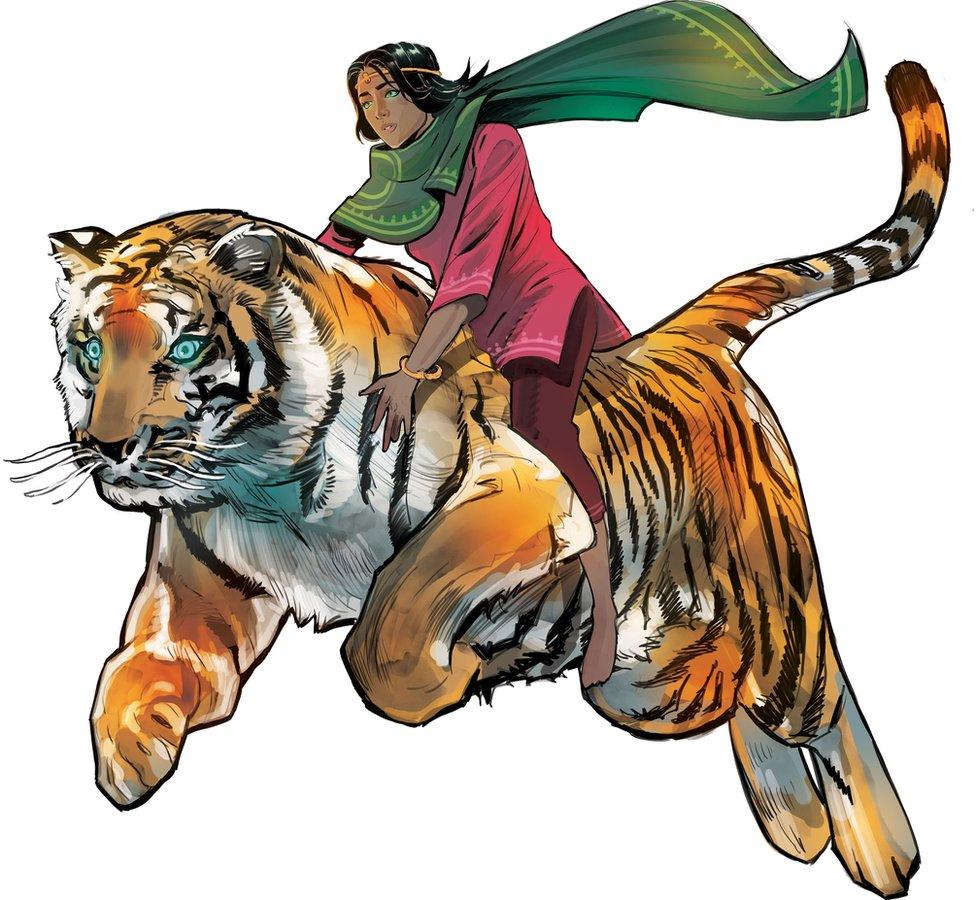
Comic crusader Priya, a gang-rape survivor who earlier campaigned against rape and acid attack, is back in a new avatar. This time she is fighting the trafficking of girls and women for sex.
The "modern-day female superhero" was first launched in December 2014, exactly two years after the horrific gang rape of a young woman on a bus in Delhi, to focus attention on the problem of gender and sexual violence in India.
In the first edition, Priya Shakti, the tiger-riding heroine challenges the stigma surrounding rape while in Priya's Mirror, the second edition, she returns to fight acid attacks.
In the latest edition - Priya and the Lost Girls - she takes on the powerful sex-trafficker Rahu, the evil demon who runs an underworld brothel city where he has entrapped many women, including Priya's sister Lakshmi.
Indian-American actor and writer Dipti Mehta, who wrote the script of the comic, draws on ancient Indian mythology to create larger-than-life fantastical characters and delivers a powerful feminist statement.
The story of Lost Girls begins when the protagonist returns home to find that there are no girls in her village.
She then mounts her flying tiger Sahas (Hindi for courage) and arrives in Rahu's den. It's a city ruled by greed, jealousy and lust, where women exist only to serve and please men - and those who resist are turned into stone.
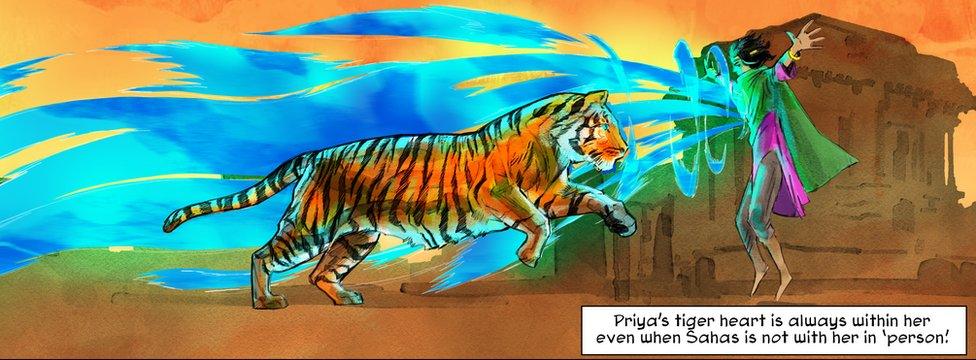
Priya is threatened and attacked, a woman who works for Rahu tries to lure her into the sex trade saying: "If you work for us, you'd serve only five to six men and not 20", but in the end, good wins over evil and she manages to vanquish Rahu and liberate her sister and all the other trafficked girls.
But victory still eludes her. The families of rescued girls refuse to take them back. The survivors are treated like "lepers", facing stigma, scorn and ridicule.
But Priya and the other girls stand up to confront patriarchy, says Ms Mehta, "just as women have broken their silence to talk about MeToo", the campaign against sexual harassment and abuse that started in Hollywood in October 2017 and later spread to many other parts of the world.
"I was very clear from the start that Lost Girls can't be just another comic book where good guy wins and evil dies, it had to be much more than that," Ms Mehta says.

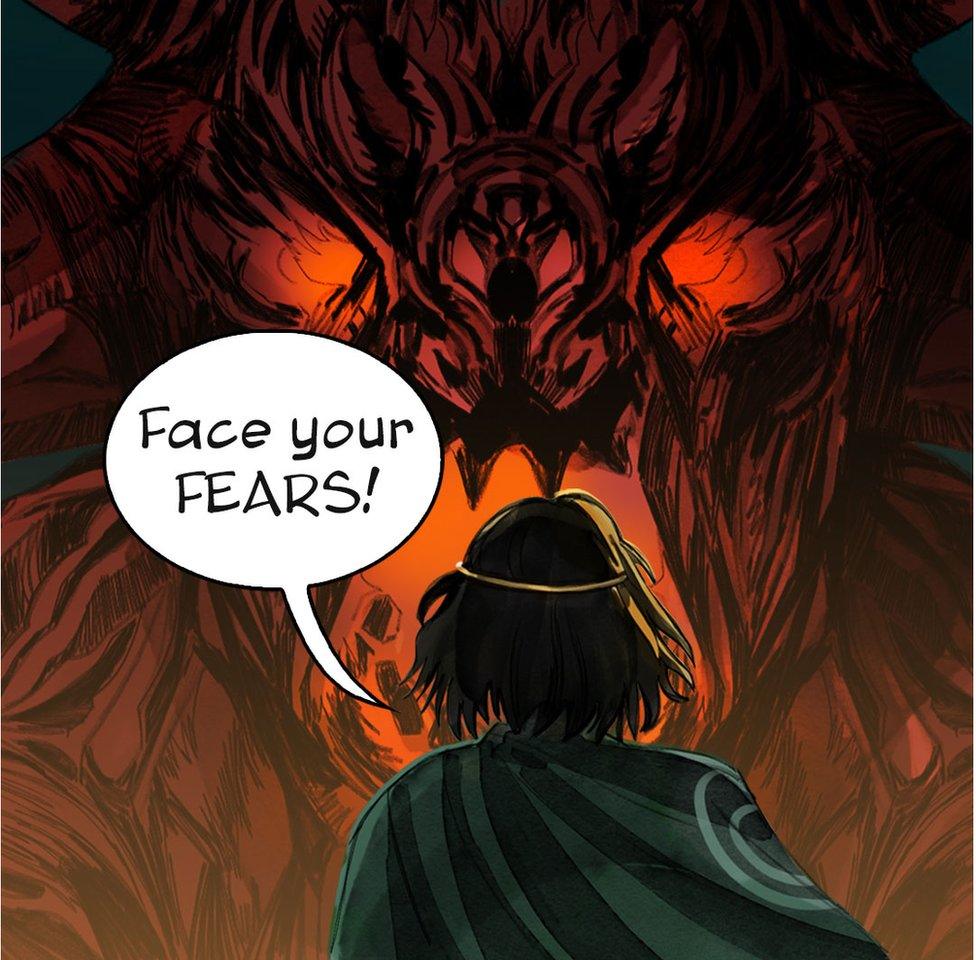

Ram Devineni, the Indian-American creator of the comic series, told the BBC that he had decided to focus on sex trafficking in this edition after visiting Sonagachi, India's largest red-light area in the eastern city of Kolkata, where he met several women engaged in sex work.
"Half of them told me they had been tricked into coming there and, once there, they were forced into the sex trade. The other half said they'd agreed to do this for a living because they were dirt poor and they had no alternative.
"Often there were two to three women sharing a small dingy room, many of them had young children who lived with them, and some of them said their children slept in the same bed where they serviced clients.
"I found that really disheartening."
Allow YouTube content?
This article contains content provided by Google YouTube. We ask for your permission before anything is loaded, as they may be using cookies and other technologies. You may want to read Google’s cookie policy, external and privacy policy, external before accepting. To view this content choose ‘accept and continue’.
Mr Devineni says that from his conversations with them, he realised that many of the women there could leave, but chose not to.
"Most believed in the idea of sacrifice, for the sake of their families, their children. The shackles that hold them back are mostly emotional and psychological coercion."
Some of their stories, he says, have found their way into the Lost Girls, which will be launched digitally on Monday to coincide with the start of United Nation's 16 Days of Activism Against Gender-based Violence.

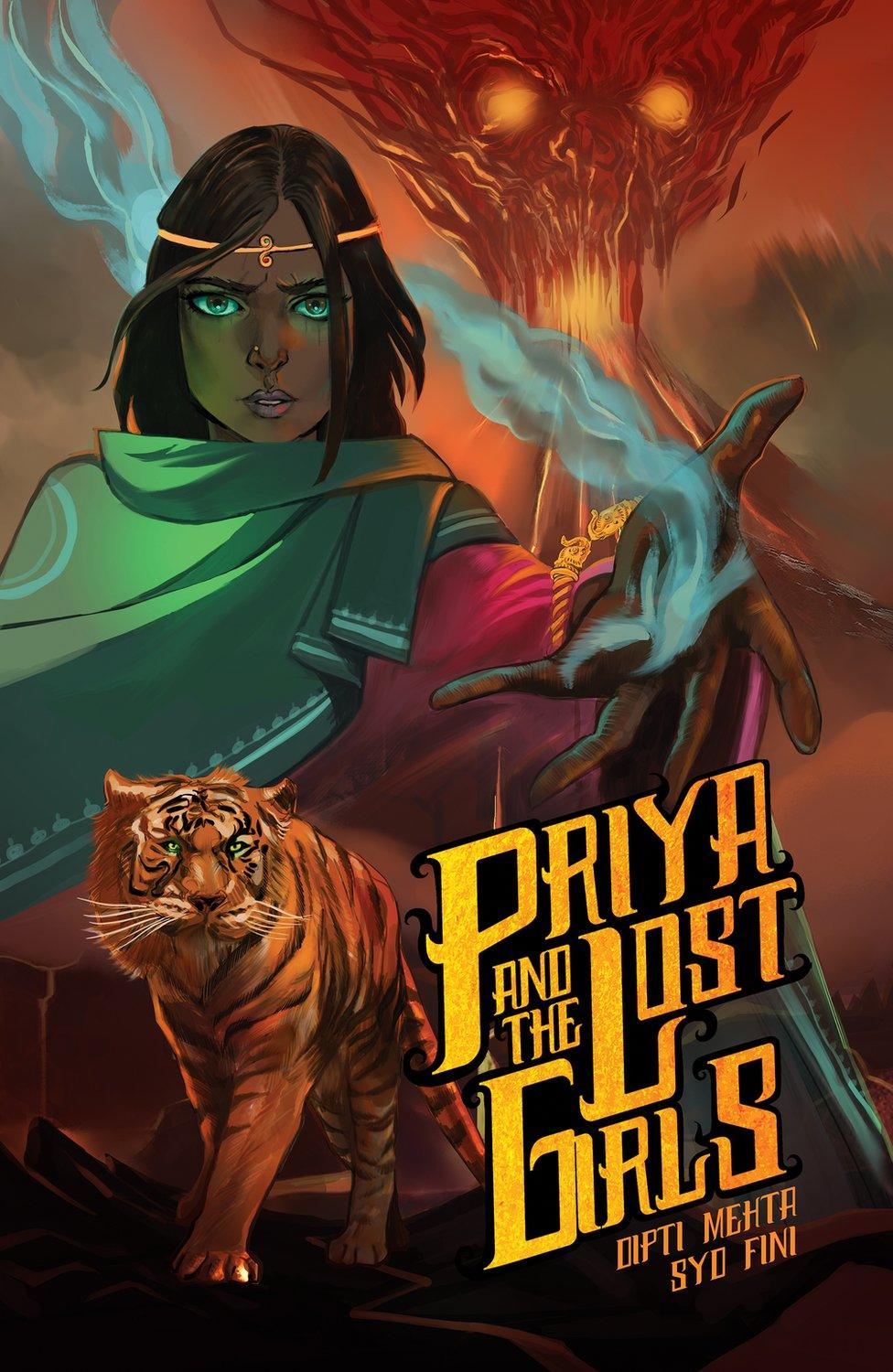

According to the United Nations Office on Drugs and Crime, human trafficking is the second largest organised criminal business in the world after the arms trade. It is even ahead of the drugs trade.
"It's a multi-billion-dollar industry," anti-trafficking activist Ruchira Gupta told the BBC on the phone from New York.
Ms Gupta, who supports trafficked girls and women in India through her charity Apne Aap Women Worldwide, says there are 100 million people trapped in human trafficking globally, of which 27 million are in India alone, and most of the trafficking is in girls and young women.
India, Bangladesh and Nepal, she says, make up "the epicentre" of global sex trafficking.
Ms Gupta, who collaborated on Priya and the Lost Girls, says she plans to take the comic to schools and colleges in India and the US to use it as a talking tool, "as a conversation starter on what is a very difficult topic".
The only way to fight trafficking, she believes, is to "de-normalise" sex trade - and cinema, art and pop culture are tools that can help do that.
The comic is made to appeal to young people. After its launch, it can be downloaded for free anywhere in the world; it also has "augmented reality features", which means people can see special animation and movies by scanning the artwork with their smartphones.
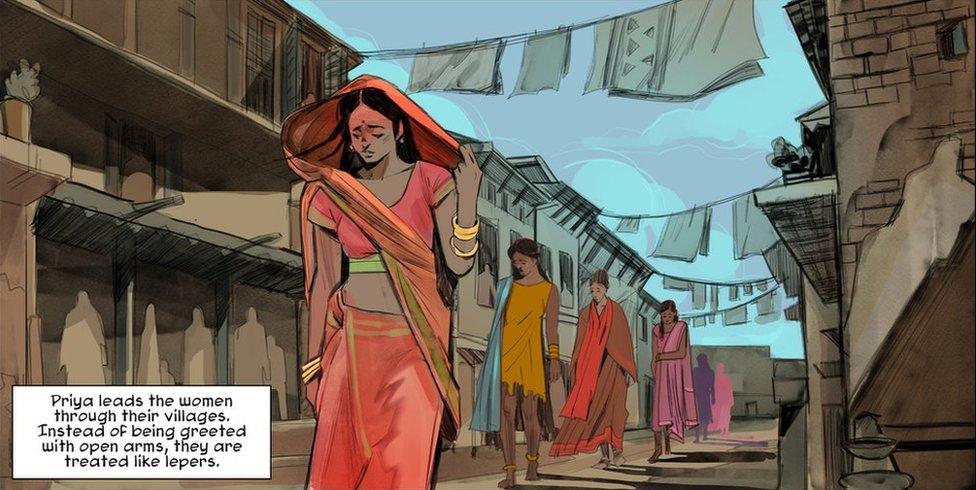
"People often make flippant comments to say that prostitution is the oldest occupation in the world, but they don't realise that trafficking is not some poor woman getting money in exchange for having sex with a man. It is the extreme exploitation of most vulnerable girls," Ms Gupta says.
To stop this "commodification" of girls, she adds, we need to create revulsion in men's minds about sex trade - and it's best to catch them young.
"We must work with young boys and teenagers, 13 to 14 year olds, through storytelling and pop culture. They learn about sex from porn sites which portray sex workers as happy hookers, and no-one sees the girl behind her.
"I want to demolish that myth of the happy hooker. I want to ensure that people see the girl behind her."
Artwork by Syd Fini and Neda Kazemifar

You may also be interested in...
Freida Pinto: Why I made a film about sex slaves

Read more from Geeta Pandey
- Published8 December 2014
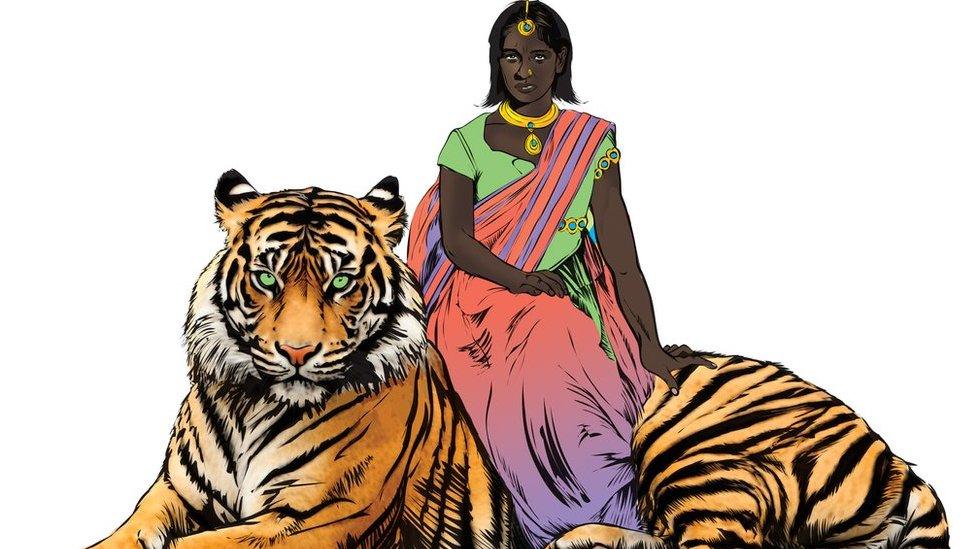
- Published26 September 2016
